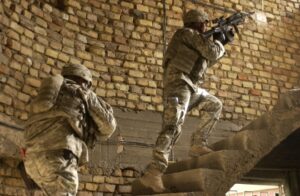Researchers Used Data from the Millennium Cohort Study from 2001-1018

U.S. Army Sgts. Jake Desmarais and James Cornett search for negative influences in Dora, Iraq, in 2007. They were with Charlie Company, 2nd Battalion, 3rd Infantry Regiment out of Fort Lewis, WA. (U.S. Army photo by Spc. Elisha Dawkins)
SAN DIEGO — Despite concerns about exposure to hazardous material, military personnel who deployed to Southwest Asia actually had a lower risk of dying from cancer than their colleagues who were never deployed, according to a new study.
Researchers from the Naval Health Research Center and the VA Puget Sound Health Care System in Seattle reached those conclusions after analyzing 661 cancer deaths. The data came from the Millennium Cohort Study, the largest and longest running health study in the U.S. military; the cancer deaths occurred between 2001 and 2018 among 194,689 servicemembers and veterans.
The report in Cancer Epidemiology, Biomarkers & Prevention pointed out that findings from previous research linking military factors with cancer-specific mortality have been inconsistent. Few of those studies focused on servicemembers and veterans who served in Operation Iraqi Freedom/Operation Enduring Freedom (OIF/OEF) conflicts, the researchers added.1
The study team determined cancer mortality between 2001-2018 from the DoD Medical Mortality Registry and National Death Index for 194,689 Millennium Cohort Study participants.
Results indicated that, in comparison with military personnel who deployed with no combat experiences, non-deployers had a greater risk of overall (HR=1.34, 95% CI=1.01, 1.77) and early cancer mortality (HR=1.80, 95% CI=1.06, 3.04). In addition, the study found that enlisted personnel had a greater risk of lung cancer mortality compared with officers (HR=2.65, 95% CI=1.27, 5.53).
The authors said they observed no associations by service component, branch or military occupation and cancer mortality. One factor, higher education, was associated with reduced overall, early and lung cancer mortality risk, while smoking and life stressors were associated with elevated overall and lung cancer mortality risk.
“These findings are consistent with the healthy deployer effect, in which military personnel who were deployed tend to be healthier than those who did not deploy,” the authors wrote. “Further, these findings highlight the importance of considering socioeconomic factors, such as military rank, that may have long-term implications for health.”
Noting that their study elucidated military occupational factors that might predict long-term health outcomes, the researchers advised that “more nuanced” environmental and occupational military exposures and their relationship to cancer mortality should be investigated.
For the study, the risk of cancer death was compared between personnel who deployed and did not experience combat, those who deployed and experienced combat, and those who did not deploy.
Results included:
- Non-deployers were 34% more likely to die from cancer compared with deployers who did not experience combat, accounting for smoking and other health behaviors, age, sex, race, ethnicity and military characteristics.
- For cancer deaths before the age of 45 years, non-deployers were 80% more likely to die from cancer than deployers who did not experience combat.
- The risk of cancer death did not differ between deployers who experienced combat compared with those without combat experience.
Healthy Deployer Effect
“These findings are consistent with the healthy deployer effect, where personnel who deploy are considered healthier and more physically fit than those who do not,” according to the report.
One disturbing finding was that enlisted personnel were almost three times as likely to die from lung cancer than officers, even after accounting for smoking and other risk factors. “This finding may be due to tasks more frequently performed by enlisted personnel that expose them to occupational airborne hazards such as exhausts, emissions, and other respiratory toxicants”, the researchers suggested.
The analysis was especially timely because of the Biden Administration’s Cancer Moonshot Program and the newly-enacted PACT Act (Section 500) which have mandated the examination of whether military-related exposures affect cancer risk among servicemembers and veterans.
“While military deployers may experience hazardous exposures that could affect their long-term health, our findings indicate that these service members had a lower overall risk of cancer death than non-deployers. Future cancer research focused on current and former military personnel should account for potential healthy deployer effects,” said senior author Rudolph Rull, PhD, MPH, who is also the principal investigator of the Millennium Cohort Study at the Naval Health Research Center.
The Millennium Cohort Study, sponsored by the DoD and VA, was launched in 2001 to understand the impacts of military service and deployments on the long-term physical health, mental health and quality of life of servicemembers and veterans. In the last two decades, the study has enrolled more than 260,000 servicemembers from all six branches of the military and their components and has become the largest and longest-running health study in military history.
- Sharifian N, Carey FR, Seay JS, Castaneda SF, Boyko EJ, Rull RP. Risk and Protective Factors for Cancer Mortality Among United States Service Members and Veterans (2001-2018). Cancer Epidemiol Biomarkers Prev. 2023 Mar 7:EPI-22-0943. doi: 10.1158/1055-9965.EPI-22-0943. Epub ahead of print. PMID: 36880966.

